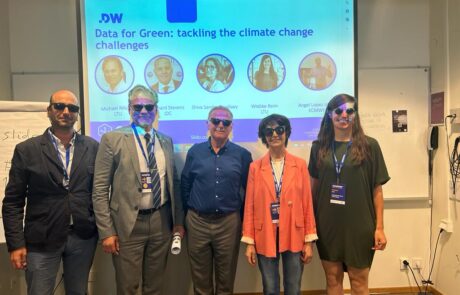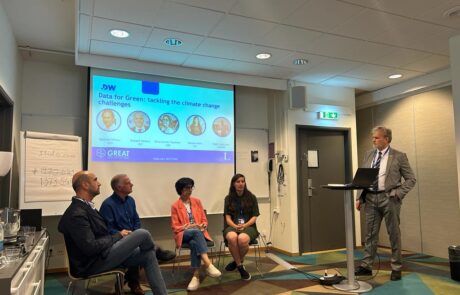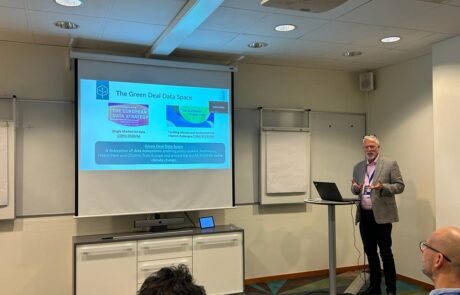Last week, the Green Deal Data Space project participated in Data Week 2023, a significant event organized by BDVA in Luleå, Sweden. This conference served as an ideal platform for experts, innovators, and stakeholders to explore the transformative potential of data-driven solutions in tackling pressing environmental challenges.
Our project actively contributed to various sessions, focusing on sustainable smart cities, energy efficiency, climate change, and the implementation of high-value datasets. In this article, we highlight the key sessions in which the Green Deal Data Space project was involved, showcasing our commitment to driving a greener and more sustainable future.
1. AI and Data Spaces for Sustainable Smart Cities – Water and Other Key Resources Challenges: The Green Deal Data Space project focused on the governance of data spaces in this session. Other project’s were presented such as WATERVERSE, a Water Data Management Ecosystem for Water Data Spaces, TEMA (Trusted Extremely Precise Mapping and Prediction for Emergency Management), and PathoCERT (Pathogen Contamination Emergency Response Technologies). These innovative initiatives showcased the power of data-driven solutions in managing water resources efficiently and responding effectively to emergencies. By leveraging artificial intelligence and data spaces, our project demonstrated the potential for creating sustainable and resilient smart cities.
2. Leveraging Earth Observation Data to Support Energy Efficiency and the European Green Deal: The Green Deal Data Space project actively participated in this session, highlighting the immense potential of Earth Observation data in enhancing energy efficiency and contributing to the objectives of the European Green Deal. Through insightful discussions and presentations, we showcased innovative approaches to leveraging this valuable resource for a greener future. Our project emphasized the importance of data-driven insights in driving energy-efficient practices and aligning with the sustainability goals of the European Green Deal. By harnessing Earth Observation data, we can optimize energy consumption, minimize waste, and promote environmental conservation.
3. Data for Green: Tackling the Climate Change Challenges: In collaboration with the Luleå University of Technology, the Green Deal Data Space project co-organized this session, dedicated to addressing climate change challenges through data-driven solutions. Our project actively contributed to discussions on strategies and technologies that can effectively combat the effects of climate change. Expert speakers from renowned organizations, including ABB Corporate Research and the European Centre for Medium-Range Weather Forecasts (ECMWF), shared valuable insights and highlighted the role of data in driving climate action. By fostering collaboration and knowledge exchange, this session emphasized the urgent need for innovative data-driven approaches to tackle climate change effectively.
4. Towards the Implementation of High-Value Datasets – First Hands-On: This session explored how projects funded under the topic Public Sector Open Data for AI can support the actual implementation of high-value datasets in EU territories, as mandated by the European Commission’s Implementing Act. The Green Deal Data Space project acknowledges the importance of open, machine-readable data in fostering transparency, accountability, and innovation in the public sector.





